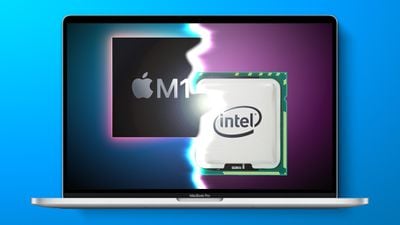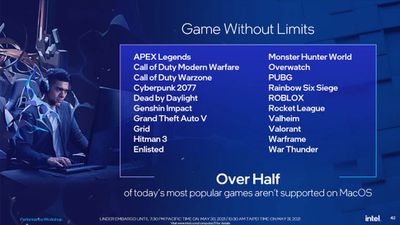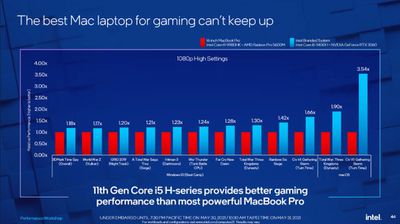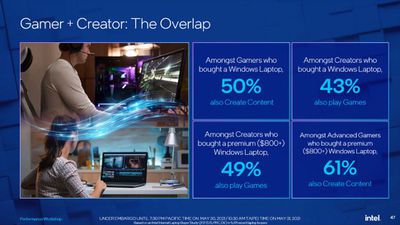While announcing its latest chips yesterday, Intel launched another aggressive public attack on Mac devices, focusing on the experience of gaming (via PC Gamer).

Intel yesterday announced two new 11th Generation H-series laptop processors, featuring clock speeds up to 5GHz, Intel Wi-Fi 6/6E, and 1080p gameplay on popular titles, in high-volume, thin designs. Following the announcement, the company took the opportunity to launch another broadside against Apple.
In a press call with Intel's chief performance strategist Ryan Shrout about the new chips, Intel outlined an argument claiming that it is the supposedly poor gaming experience on Mac devices that makes Intel-based Windows devices superior. Intel derided Apple's M1 chip and boasted that most popular video games do not run on macOS.

The company highlighted a poor gaming experience on the Mac when using an emulator or virtual machine, showing a video of the game "Valheim" running poorly in Parallels on a Mac.
Intel further evidenced its claims with a chart showing an Intel-based 16-inch MacBook Pro, using a Core i9 9980HK processor with a AMD Radeon Pro 5600M, compared to a PC with a Core i5 11400H processor with a GeForce RTX 3060. The Intel-branded PC did better in each of the company's selected tests. This led to the claim that Intel-based PCs offer a "better gaming experience than 100% of Mac laptops."

The company then argued that there is a significant overlap between creators and gamers, suggesting that a large proportion of the Mac user base is not sufficiently accommodated for due to limited gaming options on their system.

Intel now appears to be making gaming a key buttress in its argument to persuade customers that its chips in Windows machines present a much better option for consumers than Macs with Apple silicon.
PC Gamer's Alan Dexter asked Shrout during the call if Intel was "burning its bridges with Apple." Shrout responded that "Apple has been very public about moving to its own silicon" and that "it is now a competitor," justifying the company's aggressive marketing campaign.
Since the debut of Apple's M1 chip, Intel has launched an aggressive marketing campaign to disparage Apple's custom silicon and commend its own processors, including highly selective benchmarks, a range of video ads, and a heavily biased website.























